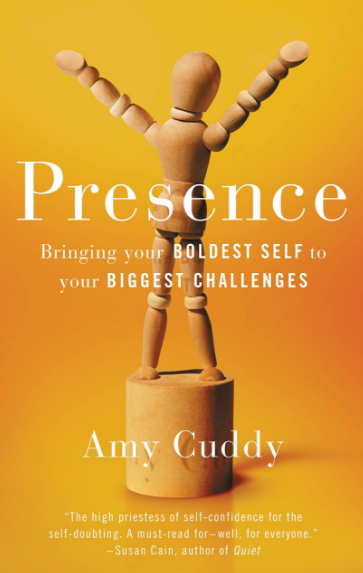A Harvard psychologist says there's one factor that defines success in a job interview

In 2004, when Harvard Business School professor Amy Cuddy was a fifth-year doctoral student, she attended a conference where she'd have a chance to rub elbows with some of the most celebrated social psychologists in the world.
It was her chance to finally give her "elevator pitch" -- a 90-second summary of her research program and goals that could help her land a job at a prestigious academic institution.
Sure enough, she soon found herself in an elevator with three prominent psychologists in her field, and one of them prompted her to give her pitch.
As Cuddy recalls in her new book, "Presence," her delivery was disastrous. She started off wrong and couldn't regain her footing, becoming more panicked by the second.
"That was the worst elevator pitch I have ever heard," one of the professors told her.
What frustrated her in the days that followed wasn't that she hadn't immediately gotten hired at any of those professors' schools. Instead, it was that she had failed to fully represent herself and all her hard work.
Eight years later, after giving a now famous TED Talk on power and self-confidence, Cuddy received multiple letters from people who had similar regrets.
Cuddy recently spoke on this topic to an audience at the 92Y in New York City, and Business Insider interviewed her beforehand. She told us that people often wrote to her about how frustrated they felt after job interviews. In most cases, they weren't upset about not getting the job -- rather, they were upset that "I didn't show them who I am."
"That's what makes people feel bad," Cuddy said.

People can generally accept a negative concrete outcome -- like not landing the job -- if they felt like they presented themselves well.
That led Cuddy to realize that success in challenging situations is about leaving without regret and feeling satisfied that you did the best you could.
Cuddy calls the ability to fully represent yourself in challenging situations "presence," and she suggests a number of ways to develop it:
1. Realize you're not alone
"About half the world is feeling this way right now," Cuddy told the audience at the 92Y, referring to that feeling of low confidence and powerlessness.
It's a highly isolating feeling, she added, partly because we're afraid to talk about our weaknesses. Men in particular often struggle to articulate their insecurities.
But, she said, it's important for men and women in this situation to "realize that you are not alone and it's not abnormal or pathological to be feeling that way."
2. Affirm your core values
Right before a job interview, or any other challenging situation, take a few minutes to write about a core value that's meaningful to you, such as your family or career success. Then write about a time when that value was important.
Even though the exercise might seem unrelated to the task at hand, it will help you remember what you as a unique person have to bring to the table.
Cuddy writes that self-affirmation is "a way of grounding ourselves in the truth of our own stories. It makes us feel less dependent on the approval of others and even comfortable with their disapproval, if that's what we get."
3. Change your body language
"The body is so linked to the mind," Cuddy told the audience at the 92Y talk. "I would say the body is constantly leading a conversation with the mind."
That's why mimicking the body language of powerful people can make you feel more confident, too.
Cuddy describes "power poses" as expansive and open -- you take up a lot of space and hold your arms and legs away from your body.
Before you head into an interview, you can try "The Performer" -- see the image on the right -- by throwing your hands in the air and widening your stance. Hold the pose for two minutes.
The bottom line: Using any -- or all -- of these techniques won't ensure that you get the job. But they will help you present your full and best self, even under stress, so that you walk out the door feeling truly successful.
Read more:
• How much the best paid workers in 20 professions earn
• Seven outdated men’s style ‘rules’ that you can now ignore
• 16 skills that are hard to learn but will pay off forever
Read the original article on Business Insider UK. © 2016. Follow Business Insider UK on Twitter.
Join our commenting forum
Join thought-provoking conversations, follow other Independent readers and see their replies
Comments
Bookmark popover
Removed from bookmarks